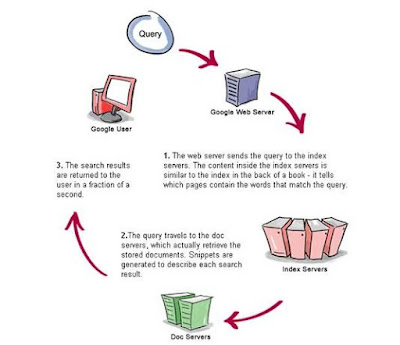Not like humans, Search engine results are text-driven. Although new generation technology advances quickly, Search engines are far away from smart and sensible creatures that may really feel the wonderful thing about a fab design or enjoy the music and motion in movies or videos.
Crawler-based search engines, similar to Yahoo, Google or Bing, create their own automatic listings. Search engine crawler "crawl" or "spider" the web, then visitor search via what they've found.
In
SEO, Search engine plays an important role. A search engine operates in the following order:
The content of each page is analyzed to determine how it should be indexed (for example, words from titles, headings, or special fields called meta-tags are extracted). The data on the web pages are stored in a database index for use in subsequent queries. A query can be a single word. The purpose of an index is to find information as soon as possible. Some search engines such as Google, store all or a portion of the site of origin (hereinafter referred to as a cache) as well as information on locations, while others, such as AltaVista, store every word on every page. This cached page always holds the actual search text since it is actually indexed, so it can be very useful if the contents of the current page was updated and the search terms are no longer in it. This problem can be considered a mild form of links dying and increases the manipulation of Google in the user experience to meet the expectations of the user that the search terms are returned on the site. This corresponds to the principle of least surprise, since the user normally expects that the search terms on the pages to be returned. Increased search relevance makes these cached pages very useful, even beyond the fact that there are data that may not be available elsewhere included.
If a user makes a query enters into a
search engine (usually with key words), checks the engine's index and provides a list of web pages by looking for its criteria, usually with a short summary of the document's title and sometimes Parts of the text. The index is constructed from the information with the data and the method by which information is stored indexed. Unfortunately, there are currently no known search engines that can search documents for the public to date. Most search engines support the use of Boolean operators AND, OR and NOT to refine your search. Boolean operators are looking for a literal that improve the user to enable and expand the search terms. The search words or phrases as they entered. Some search engines offer an advanced feature called proximity search, which users can define the distance between keywords. It is also the concept of research on the basis of the research is the use of statistical analysis in the pages that contain words or phrases you need included. In addition, natural language queries allow the user to a question in the same way that you ask a person type. A site like this would ask.com.
Most Webs
search engines are commercial enterprises are supported by advertising revenue and thus, employ some of the practice have to pay to such advertisers, their listings ranked higher in search results. Search engines do not accept money from search results make money by ads alongside relevant search results from normal search engine. Search engines make money every time someone on one of these ads.















